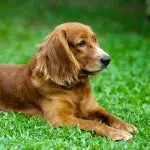Basset hound, the facts every owner of this dog breed should know
The Basset Hound originated in sixth century France and is thought to be descended from the St. Hubert Hounds. The Basset Hound (bas means ‘low-set’ in French) proved useful to hunters, with its slow movement and long ears to stir up scent, they could drive prey out from dense covering and into open fields. The Basset Hound has stamina to keep up with hunters and to track and prey for long periods of time. Basset Hounds are still used for hunting in some areas of the world. The Basset Hound is described as gentle, sociable and stubborn.
Basset Hounds are loyal to their families and good with children and other animals. They prefer to be lap dogs and do not make good guard dogs, as they will greet any stranger who approaches them as a friend. Basset Hounds tend to be strong-willed and independent, making them difficult to train, but with enough consistency this can be overcome. When out for a walk with a Basset Hound, always keep it on a leash as the hunting tendencies may override any and all training.
Though Basset Hounds have a short stature, standing 12 to 15 inches tall, they are not considered small dogs, and will on average weight 50 to 65 pounds when mature. They have short coats that are tri-colored (black, white and tan) or red and white, and require relatively little maintenance. Regular brushing will keep the coat free of dirt and reduce shedding. Baths are necessary only a few times a year, as their coats tend to repel water. A Basset Hound’s ears need regular cleaning since their long, floppy ears do not allow air to circulate, increasing the risk of infection and they do tend to slobber more than other dogs.
Basset Hounds need to be exercised frequently and often times have to be encouraged to do so as they are prone to taking naps in the sun. The Basset Hound is prone to some genetic disorders. Von Willebrand’s disease is a platelet disorder that results in mild to moderate bleeding and a longer than average bleeding time. Through breeding, the incident of this condition has been reduced in the breed.
Basset Hounds are also prone to glaucoma, gastric torsion and interdigital cysts. Some Basset Hounds are allergic to certain grasses. Without proper exercise, Basset Hounds are prone to obesity, which can cause arthritis, back pains and heart trouble.
There is a website that has great information on Basset Hounds and most other breeds of dogs. It has details that pertain to a dog breeds health, grooming, living conditions, best food choices and more, the website is called: Dog And Cat Facts, and can be found at this url:
http://www.dogandcatfacts.com
By Robert W. Benjamin
Copyright © 2006
You may publish this article in your ezine, newsletter on your web site as long as it is reprinted in its entirety and without modification except for formatting needs or grammar corrections.


